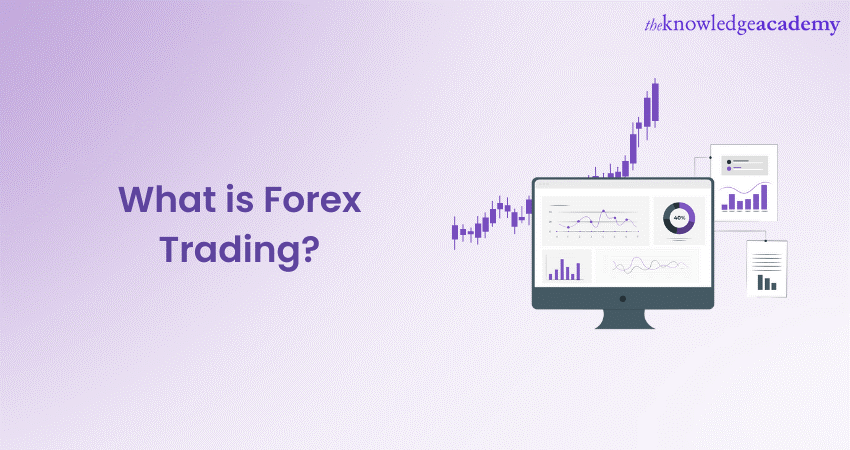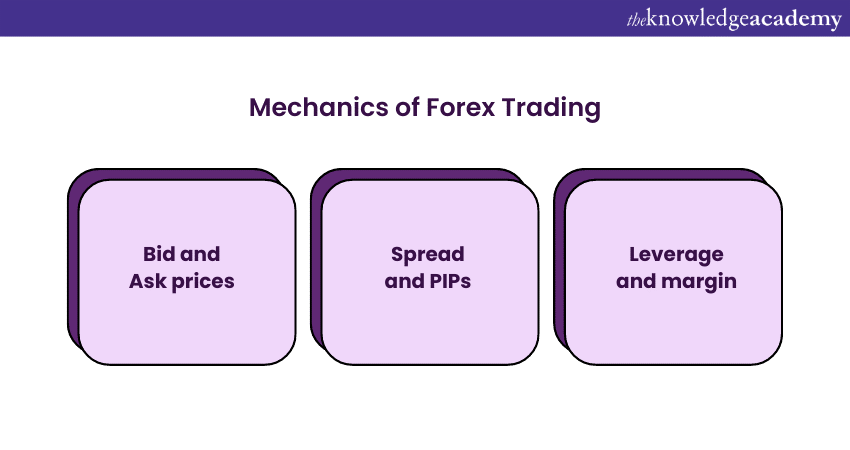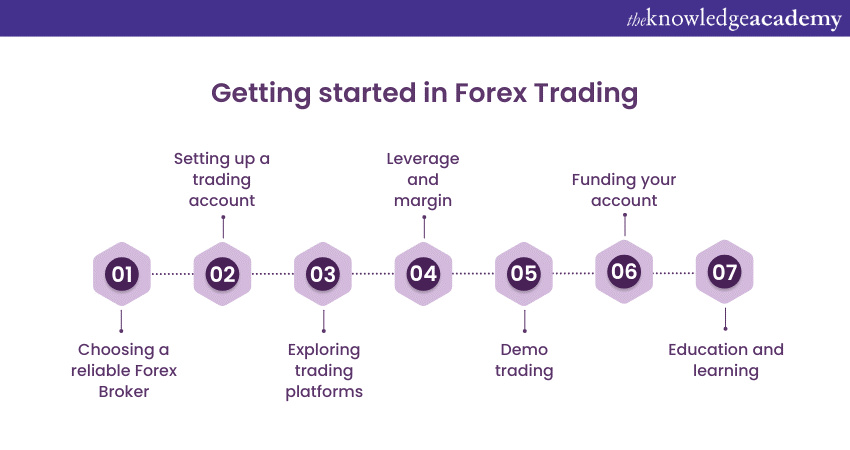We may not have the course you’re looking for. If you enquire or give us a call on +971 8000311193 and speak to our training experts, we may still be able to help with your training requirements.
Training Outcomes Within Your Budget!
We ensure quality, budget-alignment, and timely delivery by our expert instructors.

Have you ever asked yourself, "What is Forex Trading?" Forex Trading is all about understanding how currencies are purchased and sold in a global marketplace. It is like swapping your allowance with a friend's in a whole new way!
According to Glassdoor, a Forex Trader's average salary in London, UK, is £155,798. Well, if you are curious about how money from one country can be exchanged for money from another country, you are in the right place to find out. In this blog, we will talk about What is Forex Trading? Keep reading to discover the exciting world where currencies meet exchange rates along with mechanics, factors, etc.
Table of Contents
1) Understanding What is Forex Trading
2) How does Forex Trading work?
3) The mechanics of Forex Trading
4) Why do people trade Forex?
5) Ways to trade Forex
6) Factors influencing exchange rates
7) Getting started in Forex Trading
8) Analysing the Forex Market
9) Conclusion
Understanding What is Forex Trading
Forex Trading might sound complex, but at its core, it is a way of exchanging one country's currency for another's. This global marketplace, also known as the Foreign Exchange Market or Forex Market, allows people and businesses to trade currencies with the goal of making a profit. Let us break down the key components to help you grasp the concept better.
What is Forex?
Forex or Foreign Exchange refers to the process of Trading different currencies. Just like you exchange your money for things you want, countries and businesses exchange currencies for various reasons. Imagine you are planning a vacation to another country. You will need to exchange your currency for the local currency of that country. This exchange rate determines how much of foreign currency you will get for each unit of your own currency.

How does Forex Trading work?
Forex Trading involves purchasing one currency while simultaneously selling another. These currencies are always traded in pairs, such as the EUR/USD (Euro/US Dollar). When you buy a currency pair, you are betting that the first currency will strengthen against the second currency over time.
Let us say you believe that the Euro (EUR) will be stronger compared to the US (United States) Dollar (USD). You might buy the EUR/USD currency pair. If your prediction is correct and the Euro does indeed strengthen against the Dollar, you can sell the Euro back for more Dollars than you initially spent, thus making a profit.
Key participants in the Forex Market
The Forex Market is made up of various participants, each with their own motivations and roles:
a) Banks and financial institutions: They trade currencies for their clients and manage their own portfolios.
b) Corporations: Companies engaged in international trade use Forex to convert currencies for their business needs.
c) Governments: National governments intervene in the Forex Market to stabilise their own currency or influence their economy.
d) Investors and Traders: Individuals and institutions trade currencies to profit from price movements.
Major currency pairs
Not all currencies are equal in the Forex Market. Some currencies are more widely used and traded than others. The most traded currencies are the major currency pairs, which involve the most influential economies in the world. These pairs include:
a) EUR/USD: Euro/US Dollar
b) USD/JPY: US Dollar/Japanese Yen
c) GBP/USD: British Pound/US Dollar
d) USD/CHF: US Dollar/Swiss Franc
These pairs are popular because they have high liquidity, meaning they are actively traded.
Unlock the secrets of successful Investment and Trading – Join in our Investment and Trading Training today!
The mechanics of Forex Trading

Understanding these fundamental aspects will equip you with the knowledge to navigate the world of Forex Trading more effectively.
Bid and Ask prices
Within the Forex Market, each currency pair presents two prices:
1) The Bid price signifies the value at which the base currency (the first in the pair) can be sold.
2) The Ask price denotes its purchase value. The spread, the gap between these prices, acts as a transaction fee.
Spread and PIPs
Spread is commonly assessed in PIPs, which stands for "Percentage in Point" or "Price Interest Point." A PIP signifies the tiniest price shift in a currency pair and denotes a value change of one unit in the final decimal point of the price. Suppose the EUR/USD pair shifts from 1.1500 to 1.1501 – that is a One-PIP change.
Leverage and margin
Leverage stands as a potent instrument enabling you to manage a larger position with a comparably smaller capital sum. This ratio, like 50:1 or 100:1, magnifies gains and losses alike, necessitating careful usage. Conversely, margin pertains to the funds you must reserve in your trading account for initiating and upholding a trade. Serving as a safety net, it guarantees coverage for potential losses.
Elevate your Revenue game with expert Revenue Management Training.
Why do people trade Forex?
Forex Trading is exchanging one currency for another to make a profit. People trade forex for different purposes, such as:
Speculating on currency movements
It means predicting whether a currency will increase or decrease in value compared to another one, based on the market forces of supply and demand. For example, if a trader thinks that the US dollar will get weaker against the Euro, they can buy EUR/USD and sell it later at a higher price. There are different ways to trade forex, depending on how long the trader wants to hold their position and how much risk they are willing to take. Some of the common Trading styles are scalping, day Trading, swing Trading and position Trading.
Hedging against currency risk
It means reducing the exposure to unfavourable changes in currency rates that may affect the value of other investments or businesses. For example, if a trader has a long position in EUR/USD and expects the Euro to depreciate, they can hedge by opening a short position in GBP/USD, which tends to move in the same direction as EUR/USD. This way, if the Euro drops, the loss in EUR/USD will be compensated by the profit in GBP/USD.
Taking advantage of market opportunities
The forex market is open 24 hours a day, five days a week, covering different time zones and regions. This means that Traders can always find opportunities to trade, no matter where they are or what time it is. We also offer weekend Trading on some of the major currency pairs, such as GBP/USD, EUR/USD and USD/JPY, which gives you more options and flexibility.
Unlock the world of Crypto Trading with our expert-led Cryptocurrency Trading Training!
Ways to trade Forex
Forex Trading is the exchange of currencies for profit. There are three main ways to trade Forex on a large scale:
a) Spot market: The main Forex market where currencies are traded and priced in real-time, based on supply and demand.
b) Forward market: A market where Forex Traders agree to buy or sell a certain amount of currency at a fixed exchange rate on a future date.
c) Futures market: A market where Forex Traders buy or sell standardised contracts on an exchange to trade a set amount of currency at a specific exchange rate on a future date.
Forex Traders can speculate on currency movements, hedge against currency risk, or take advantage of market opportunities. Forex Trading is open 24 hours a day, five days a week, covering different time zones and regions. We also offer weekend Trading on some of the major currency pairs, such as GBP/USD, EUR/USD and USD/JPY, which gives you more options and flexibility.
Factors influencing Exchange Rates
Exchange Rates act like the pulse of Forex Trading, deciding how much one currency is worth compared to another. To guess these rates and make clever Trading decisions, it is important to know why they change. Let us check out the main things that push and pull exchange rates.
Economic indicators
Economic indicators, like GDP, unemployment rates, inflation, and consumer confidence, hold immense sway over exchange rates. A strong economy often means a stronger currency, as it entices foreign investments and spikes demand for that currency.
Interest rates
Interest rates are set by a country's central bank to influence its currency's value. Higher interest rates can attract Foreign Investors seeking better returns on their investments. Consequently, increased demand for the currency can lead to an appreciation in its value. Conversely, lower interest rates can lead to depreciation.
Political stability and economic performance
Political stability and a country's economic performance are closely intertwined. Countries with stable governments and strong economies tend to attract foreign investment, boosting demand for their currency. On the other hand, political uncertainty or economic instability can lead to a decrease in currency value due to reduced Investor confidence.
Market sentiment
The psychology of Traders and Investors can significantly impact exchange rates. Positive news and a general sense of optimism can lead to high demand for a currency, causing its value to rise. Conversely, negative news or uncertainty can trigger a decrease in demand and a currency's depreciation.
Unlock the Secrets of Forex Trading: Join our Foreign Exchange Training today!
Getting started in Forex Trading

Starting your adventure in Forex Trading is exciting, but it is like building a sturdy base before you jump in. Here is a simple guide to help you start off on the right track.
Choosing a reliable Forex Broker
A Forex Broker is like your guide in the Forex Market. They provide you with a platform to trade, offer various tools, and execute your trades. It is crucial to choose a Broker that is trustworthy, regulated, and suits your Trading needs. Look for reviews, compare features, and make sure they have good customer support.
Setting up a trading account
Once you have picked a Broker, you will need to open a Trading account. This involves sharing some personal information and verifying your identity. It is a standard procedure to ensure security and prevent fraudulent activities.
Exploring trading platforms
Trading platforms are like your cockpit in the Forex Market. Forex Brokers offer charts, tools, and options to execute trades. Explore the trading platform your Broker provides. Make sure it is user-friendly and suits your trading style.
Leverage and margin
One aspect of Forex Trading that often requires careful understanding is leverage. Leverage allows you to control a larger Trading position with a smaller amount of money. While it can amplify your profits, it can also increase your losses.
Demo trading
Before you start Trading with real money, it is a smart idea to practice with a demo account. This is like a simulation of real Trading. It helps you get familiar with the platform, test your strategies, and build confidence without risking your money.
Funding your account
Once you are comfortable with the platform, you will need to fund your Trading account. Different Brokers offer various funding methods, like bank transfers, credit cards, or online payment systems. Choose the method that is convenient and secure for you.
Education and learning
Forex Trading is a learning journey. Invest time in educating yourself about different Trading strategies, market analysis techniques, and risk management. There are plenty of resources, courses, and educational materials available online to help you.
Analysing the Forex Market
To be a successful Trader, you need to understand what is happening in the market and predict where it might go next. Here is how you can become a market detective.
Fundamental analysis
Fundamental analysis involves studying news, economic reports, and global events that impact economies. For instance, if a country's economy is strong and growing, its currency tends to become more valuable. By these factors, Traders can make more informed decisions.
Technical analysis
In Technical analysis, Traders study charts and graphs that show how a currency's price has moved over time. They look for patterns and trends that often repeat. If they spot a pattern that indicates a currency might go up, they might decide to buy.
Sentiment analysis
Sentiment Analysis is all about feelings. Traders' collective feelings can influence market movements. Positive sentiment can lead to more buying, driving prices up. Negative sentiment might trigger selling, causing prices to drop.
Elevate your Forex Trading skills with our comprehensive Forex Trading Masterclass!
Conclusion
In the world of Forex Trading, understanding What is Forex Trading forms the foundation. It is about exchanging currencies to profit from their changing values. Your strategy, like a roadmap, guides your trades. Different approaches, like Scalping for quick gains or Position trading for long-term trends, offer choices. Tools like Position sizing, Stop-loss, and Take-profit help to protect your investments. Success comes from learning, adapting, and disciplined execution.
Frequently Asked Questions

Mastering Forex Trading can enhance your career prospects by opening up opportunities in various sectors, such as finance, banking, consulting, or Trading firms. You can also work as a self-employed trader and earn income from your own strategies.

The key skills employers look for in Forex Trading professionals are:
a) Analytical skills
b) Risk management
c) Discipline
d) Patience
e) Financial management

The Knowledge Academy takes global learning to new heights, offering over 30,000 online courses across 490+ locations in 220 countries. This expansive reach ensures accessibility and convenience for learners worldwide.
Alongside our diverse Online Course Catalogue, encompassing 17 major categories, we go the extra mile by providing a plethora of free educational Online Resources like News updates, Blogs, videos, webinars, and interview questions. Tailoring learning experiences further, professionals can maximise value with customisable Course Bundles of TKA.

The Knowledge Academy’s Knowledge Pass, a prepaid voucher, adds another layer of flexibility, allowing course bookings over a 12-month period. Join us on a journey where education knows no bounds.

The Knowledge Academy offers various Investment and Trading Courses, including Day Trading Course, Stock Trading Masterclass and Revenue Management Training. These courses cater to different skill levels, providing comprehensive insights into the Steps of Investment Process.
Our Business skills blogs cover a range of topics related to Investments, offering valuable resources, best practices, and industry insights. Whether you are a beginner or looking to advance your Investment and Trading skills, The Knowledge Academy's diverse courses and informative blogs have you covered.







 Top Rated Course
Top Rated Course



 If you wish to make any changes to your course, please
If you wish to make any changes to your course, please


